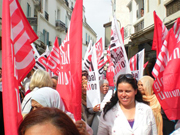MENU
Accès Affiliés
Login
Login

The “Jasmine Revolution” was a huge victory for all Tunisians. This democratic movement holds the promise of great gains for workers not just in Tunisia but it sparked the democratic movement across North Africa.
Immediately after the revolution, UGTT and FGPS won guarantees against contracting out public sector cleaning work. In fact, workers who had their jobs contracted out were re-employed by the government. Subcontracted cleaners in the private sector, however, have continued to fight for decent work. These workers earn only 75-90 Euros a month and are among the precarious workforce, who have no social protections and no job security.
UNI Property Services held its annual Steering Committee meeting, and a leadership conference on organising and bargaining, in Tunis to show international support for private sector cleaners in FGPS. 50 rank-and-file cleaners (overwhelmingly women) joined the conference. Leaders from Sweden, Holland, USA, Spain, Argentina, Italy and Germany joined these meetings.
The Netherlands delegation included 6 cleaners who shared their knowledge of organising strategies and tactics and their successful 2010 “Schoon Genoeg” (“Clean Enough” and “Enough is Enough”) Campaign. Leaders from the USA, Spain and Italy also shared bargaining and organising strategies and experiences with the cleaners.
On 26 September 2011, an international delegation, along with Mongi Abherrahim the President of FGPS, met with the Tunisia Minister of Social Affairs who committed to this group of roughly 15 trade unionists, that private sector cleaners would have a contract by the end of December 2011. Both the Minister and his Chief of Staff said that equity and fairness require that all cleaners, regardless of their public or private employment status, deserve jobs with decent pay and social protections. This announcement from the Minister was a break-through for the FGPS which has been fighting for years for a collective agreement for private sector janitors.